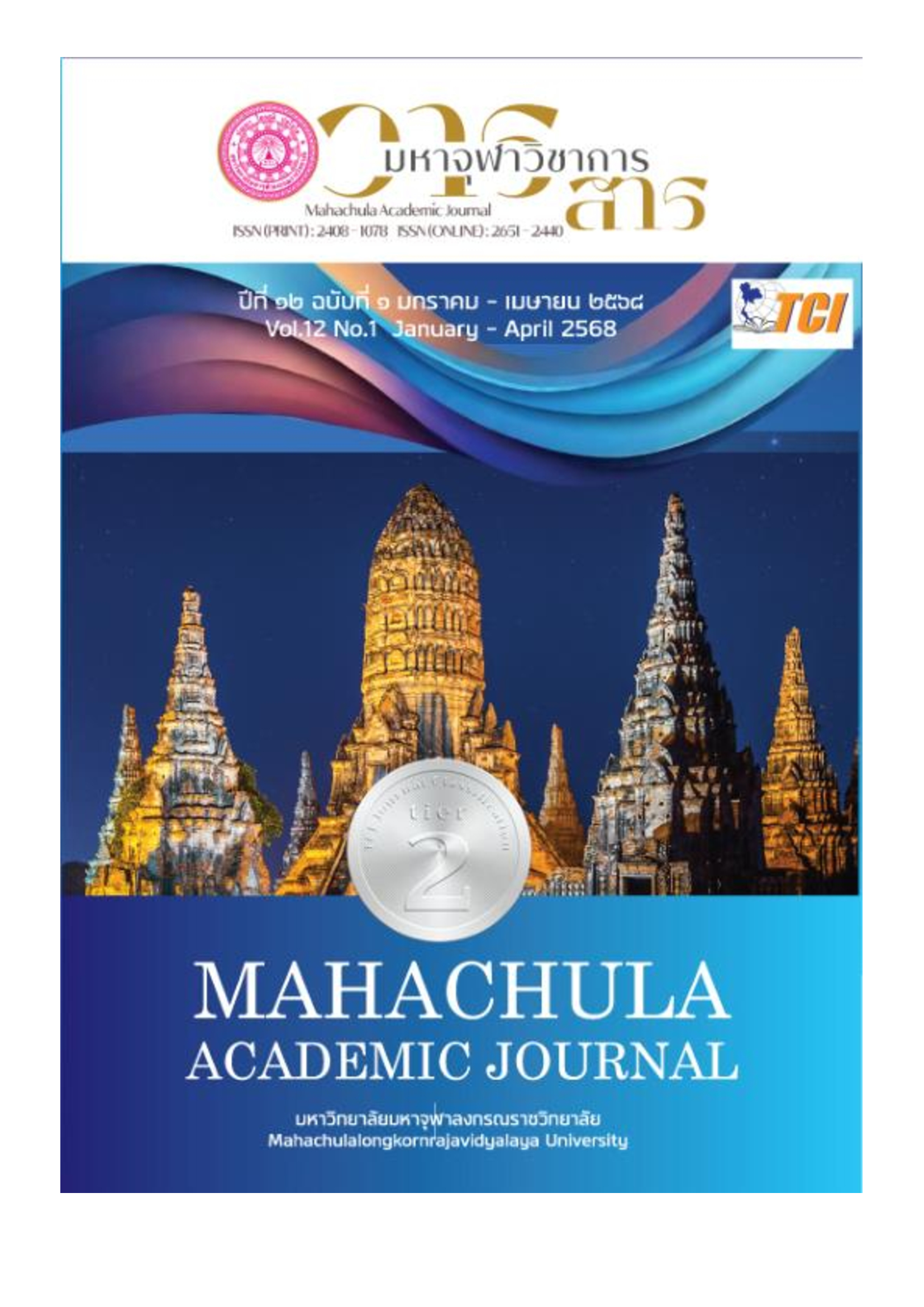The Term “Dhammacakkhu”: An Explanation through Ludwig Wittgenstein's Language Games
Main Article Content
Abstract
In the Pali Canon, the term dhammacakkhu specifically refers to the sotāpattimagga. However, in the commentaries and subcommentaries, the definition of dhammacakkhu varies. Some sources indicate that it refers to the sotāpattimagga, while others define it as the Three Paths and Three Fruits (magga 3 phala 3) or the Four Paths and Four Fruits (magga 4 phala 4). However, It can be argued that the meaning of dhammacakkhu in Buddhist scriptures is ambiguous and lacks objectivity. Therefore, the purpose of this paper is to explain the term dhammacakkhu using Ludwig Wittgenstein's of language games to avoid such criticism. The article is divided into two parts:
(1) Wittgenstein's language games and (2) the explanation of the term dhammacakkhu through Wittgenstein's language games. The study collects definitions of dhammacakkhu from the Pali Canon, commentaries, subcommentaries, and Wittgenstein's language games as presented in Philosophical Investigations, and then explains the term dhammacakkhu through Wittgenstein's language games. The study reveals that (1) Meaning in context: Dhammacakku is contextually related to the circumstances and individuals who attain enlightenment. For instance, in the context of a Sotāpanna, it refers to the Sotāpattimagga, whereas in the context of an Arahant, it refers to the Four Paths and Four Fruits (Magga 4 Phala 4). (2) Language as part of life’s activities: The use of the term Dhammacakku reflects the practice of Dhamma and the attainment of enlightenment at different levels. (3) Family resemblance: Dhammacakku shares a similar meaning in terms of enlightenment but differs in the levels of defilement eradication (kilesa). (4) Rule-following: Dhammacakku refers to the ability to see the Dhamma or the realization of the Dhamma. The Dhammacakku does not arise from philosophical thinking alone but is the result of the practice of Dhamma. Furthermore, Interpreting Dhammacakku requires considering its contextual usage. For instance, in one context, Dhammacakku may refer to the Sotāpattimagga, while in another context, it may refer to the Three Paths and Three Fruits (Magga 3 Phala 3).
Article Details

This work is licensed under a Creative Commons Attribution-NonCommercial-NoDerivatives 4.0 International License.
References
มหาจุฬาลงกรณราชวิทยาลัย. พระไตรปิฎกภาษาไทย ฉบับมหาจุฬาลงกรณราชวิทยาลัย.กรุงเทพมหานคร: โรงพิมพ์มหาจุฬาลงกรณราชวิทยาลัย, ๒๕๓๙.
มหาจุฬาลงกรณราชวิทยาลัย. ธมฺมสงฺคณีมูลฏีกา. กรุงเทพมหานคร: โรงพิมพ์มหาจุฬาลงกรณราชวิทยาลัย, ๒๕๓๘.
มหาจุฬาลงกรณราชวิทยาลัย. สุมงฺคลวิลาสินิยา นาม ทีฆนิกายฏฺฐกถาย สีลกฺขนฺธวคฺควณฺณนา (ปฐโม ภาโค). กรุงเทพมหานคร: โรงพิมพ์วิญญาณ, ๒๕๓๒.
มหาจุฬาลงกรณราชวิทยาลัย. อรรถกถาภาษาไทย พระวินัยปิฎก สมันตปาสาทิกา ภาค ๓. กรุงเทพมหานคร: โรงพิมพ์มหาจุฬาลงกรณราชวิทยาลัย, ๒๕๖๐.
มหาจุฬาลงกรณราชวิทยาลัย. อรรถกถาภาษาไทย พระสุตตันตปิฎก ทีฆนิกาย สีลขันธวรรค. กรุงเทพมหานคร: โรงพิมพ์มหาจุฬาลงกรณราชวิทยาลัย, ๒๕๕๗.
มหาจุฬาลงกรณราชวิทยาลัย. อรรถกถาภาษาไทย พระสุตตันตปิฎก สังยุตตนิกาย สฬายตนวัคค-มหาวารวัคควัณณนา สารัตถัปปกาสินี ภาค ๓. กรุงเทพมหานคร: โรงพิมพ์มหาจุฬาลงกรณราชวิทยาลัย, ๒๕๕๓.
Agetue, K. N. “Wittgenstein’s concept of language game: A critical discourse”. Abraka Humanities Review. Vol.12 No. 1 (2022): 106-114.
Amberg, J. S., & Vause, D. J. American English: History, Structure, and Usage. Cambridge: Cambridge University Press, n.d.
Wittgenstein, L. Philosophical Investigations. Translated by G.E.M. Anscombe. 3rd edition. Oxford: Blackwell Publishing, 2001.
Xia, Y. “A Comparative Analysis of Early and Late Ludwig Wittgenstein’s Philosophical Thoughts”. Proceedings of the 2nd International Conference on Social Psychology and Humanity Studies, (2024): 38-42.
Yule, G. The Study of Language. 4th ed.. Cambridge: Cambridge University Press, 2010.
Stanford Encyclopedia of Philosophy. Ludwig Wittgenstein. [online]. Retrieved from https://plato.stanford.edu/entries/wittgenstein/ [October 31, 2024].


